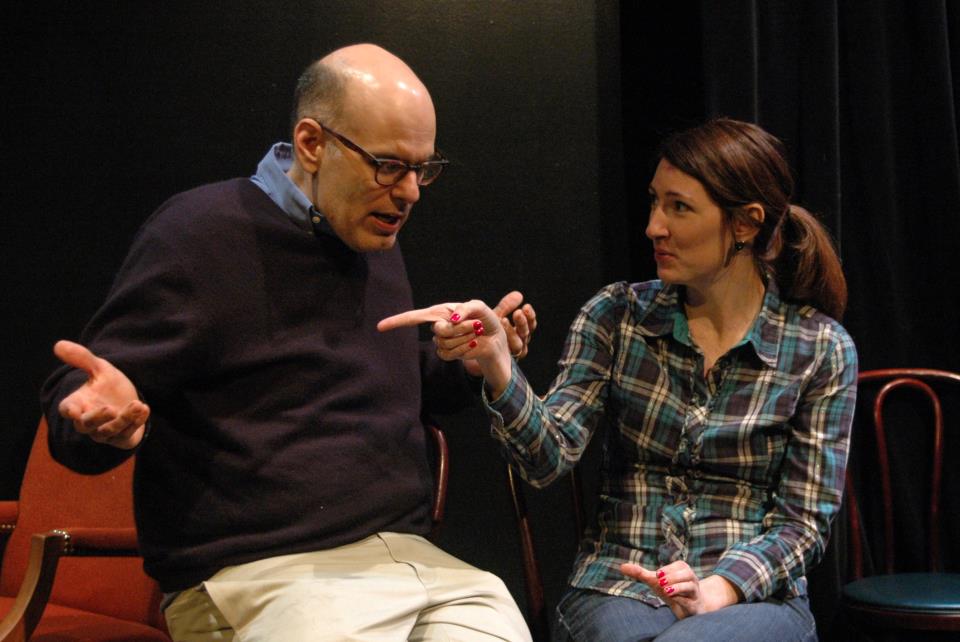Improv Tips: Stop creating a problem

Lately, I have been noticing that students in my improv classes feel they have to create some sort of problem at the top of the scene.
They’ll say something like: "You didn't pay the rent," or "Oh, great you broke the TV, now what?" or "I broke Mom's favorite vase."
This is not a good initiation. A better one would be something where you state how you’re feeling about the other person or noticing how they’re feeling. You could say, “I feel hurt you didn’t come to my birthday party,” or “Boy, Carol, you look sad today.”
I can't think of anything that will bring a scene to screeching halt faster than INVENTING some problem.
By inventing a problem, you automatically put the other players into plot mode. Instead of improvising, they will be desperately trying to "play write" themselves out of corner. Plot is death to improvising. I have even seen scenes going along nicely and then out of nowhere one of the players will slam on the brakes by manufacturing some cliché problem. It's tragic to watch.
Why do improvisers do this? The simple answer is fear. We are afraid that nothing is happening in the scene, when really, the opposite is true. Instead of taking a couple of seconds to breathe and focus on our partner, we’d rather rely on our cleverness, our words, to force something into the scene that doesn't belong. Forcing something, like "You broke my mom's favorite vase" or "You did not pay the rent again," makes us feel safe and in control, and in the process we stop improvising. We traded the feeling of "being in the moment" for the illusion of being in charge.
Of course, there are other reasons improvisers create “problems” on stage, too. Are you the type of person who is always creating problems that you can avoid the connection and the joy in your life? If so, then chances are you may be doing the same thing in your improvising.
Improv Tips to Try
Next time you’re up on stage, try this: When you start panicking, stop and wait in the silence, then look for the emotion in the scene that’s already there. You’ll find you have great stuff to work with.


Great to know this, I will make sure I don't plot my partner anymore.
Enjoy all your blogs, Jimmy, but this one is particuarly helpful. Fear - argh! In all apects of life - including improv - fear is the first enemy.
Hi Jimmy,
Great topic here! I believe improvisors want to work fast and get to the game of the scene as soon as possible. With many large ensembles an improvisor may get a few words in before he/she gets edited. I agree there is fear as a motivator mostly because folks want to be seen and heard and show how brilliant they are before their team gets cut. There is pressure to work fast and often if there is a micro second of silence on stage its felt like a huge void and there is a need to fill in that gap. Often times a person has a far better scene going on in their head then what's on stage and they are very generous to share it with everyone. There are many great performers here in Chicago and we all want to work like them and have successfull careers in improv. Some people can process information extremely quickly and think fast on their feet. ahh I've run out of things to say. Thanks!
This is great! I relate to the fear and creating problems so I don't have to sit in the fear. Got it! Love it. Thank you - great post!
While I agree with this tends to be an issue for first year students, I disagree with the sentiment that across the board, these are bad initiations. If I'm in a scene and my partner starts with "You didn't pay the rent," I will take that as a huge gift and start to embody a character that wouldn't pay the rent. My second line might be "I borrowed your car" and I'd continue heighten my behavior making the situation worse. Fear to me, is caused by someone judging the initiation instead of being open and willing to accept all offers and fully commit to them.
I needed this so much, thank you!
This is an interesting post. I thought and many others do, that problems are desirable in improv scenes because they are a central element of story telling. Are you advising actors might want to avoid problems in scenes entirely? I do get your point about plot, so are you completely averse to any narrative in improv? Thanks!